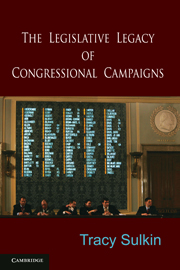Book contents
- Frontmatter
- Contents
- List of Figures
- List of Tables
- Acknowledgments
- 1 Promises to Keep?
- 2 Campaigns as Signals
- 3 Campaign Appeals and Legislative Activity
- 4 Mechanisms Underlying Promise Keeping
- 5 Promise Making and Promise Keeping on Defense and Environmental Issues
- 6 The Who, When, and Where of Follow-through
- 7 The Electoral Implications of Promise Keeping
- 8 Promises and Policy Making
- 9 Representation, Responsiveness, and the Electoral Connection
- References
- Index
7 - The Electoral Implications of Promise Keeping
Published online by Cambridge University Press: 05 June 2012
- Frontmatter
- Contents
- List of Figures
- List of Tables
- Acknowledgments
- 1 Promises to Keep?
- 2 Campaigns as Signals
- 3 Campaign Appeals and Legislative Activity
- 4 Mechanisms Underlying Promise Keeping
- 5 Promise Making and Promise Keeping on Defense and Environmental Issues
- 6 The Who, When, and Where of Follow-through
- 7 The Electoral Implications of Promise Keeping
- 8 Promises and Policy Making
- 9 Representation, Responsiveness, and the Electoral Connection
- References
- Index
Summary
The evidence presented over the past several chapters is consistent with a depiction of promise keeping as a reelection-oriented strategy. Legislators appear to choose campaign themes that are likely to resonate with their constituents and for which they can credibly claim interest and credit. Once they are in office, they follow through on their appeals, with almost all expending at least some time and effort on them, and many devoting a substantial portion of their legislative agendas to activity on these issues. Moreover, levels of promise keeping vary systematically with electoral vulnerability, and representatives' and senators' choices about where and when to engage in the most responsiveness correspond to electoral imperatives.
It is reasonable to conclude from these patterns that legislators choose to engage in promise keeping at least in part to help themselves electorally. However, it is also possible that the links we observe between characteristics of legislators and their promise-keeping behavior are mostly a by-product of good matching between a constituency and its representative or senator. If all legislators talk and act solely on their own interests, but for some of them these interests also align with those of the constituency (and this close match in interests means that the constituency is more favorable to the legislator), this could produce a positive relationship between vote share and subsequent levels of promise keeping.
In many ways, such a situation (what Burden [2007] calls “coincidental representation”; see also Fenno 1978, Parker 1992) is not normatively problematic.
- Type
- Chapter
- Information
- The Legislative Legacy of Congressional Campaigns , pp. 152 - 175Publisher: Cambridge University PressPrint publication year: 2011



